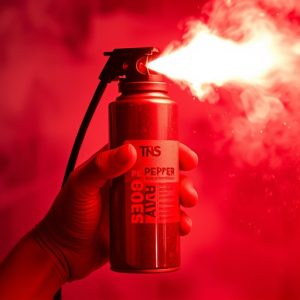Civilian-Grade Pepper Spray: Safety, Effectiveness, and Flammability Facts
Civilian-grade pepper spray, non-lethal self-defense tool, uses capsaicin to irritate eyes, nose, an…….
Civilian-grade pepper spray, non-lethal self-defense tool, uses capsaicin to irritate eyes, nose, and throat, temporarily disabling attackers. Despite myths, it's not flammable; proper storage and usage precautions should be followed to avoid potential risks. Legalities vary by region, with penalties for unauthorized use; successful deterrent in various scenarios but shouldn't replace other safety measures.
“Uncover the power of civilian-grade pepper defense spray—a non-lethal self-defense tool gaining popularity for its effectiveness. This article demystifies this potent spray, exploring its workings, safety aspects, and legality. From understanding the chemistry behind its sting to addressing concerns about flammability, we guide you through the essentials. Discover real-world use cases and learn how pepper spray can offer a strategic advantage in personal safety, all while considering key legal boundaries.”
- What is Civilian Grade Pepper Defense Spray?
- How Does Pepper Spray Work?
- Is Pepper Spray Flammable? Safety Precautions
- Legal Considerations and Effective Use Cases
What is Civilian Grade Pepper Defense Spray?
Civilian-grade pepper defense spray, often simply called pepper spray, is a non-lethal self-defense agent designed for use by civilians to deter and incapacitate attackers. It’s an aerosol spray that contains capsaicin, the active ingredient derived from chili peppers. When deployed, it irritates the eyes, nose, and throat, leading to temporary blindness, coughing, and difficulty breathing—effects that subside after a few minutes.
Unlike some commonly held beliefs, civilian-grade pepper defense spray is not typically flammable. It’s designed to be a safe and effective solution for personal protection in various situations, from walking alone at night to protecting against animal attacks. Its non-flammable nature makes it a preferred choice for individuals seeking to defend themselves without risking additional hazards.
How Does Pepper Spray Work?
Pepper spray, also known as oleoresin capsicum (OC) spray, works by targeting the human body’s sensory system. It contains a compound derived from chili peppers that activates specific nerve endings in the eyes and nose when exposed. This activation leads to intense irritation, causing tears, coughing, and difficulty breathing. The effects are designed to be temporary but powerful enough to disable an attacker, giving the user time to escape or seek help.
Unlike some common misconceptions, pepper spray is not flammable. It’s a non-flammable liquid that quickly dissipates into the air upon application. This myth might arise from the idea that the spray creates a visible mist that can be blown away, but this does not make it combustible. In fact, its primary effect is to cause temporary disorientation and discomfort, making it an effective self-defense tool for civilians without causing any fire risk.
Is Pepper Spray Flammable? Safety Precautions
Pepper spray, a popular self-defense tool, has sparked concern among users regarding its flammability. Contrary to some beliefs, pepper spray is not flammable in itself. The active ingredient, capsaicin, does not produce a burn or ignite when exposed to flames. However, this doesn’t mean it’s fireproof. When pepper spray comes into contact with an open flame, the can may heat up and potentially explode, releasing its contents. This is why it’s crucial to keep pepper spray away from direct heat sources or flames.
Safety precautions are essential when handling and storing pepper spray. Always follow manufacturer guidelines, which often include storing the canister in a cool, dry place and keeping it out of reach of children and heat sources. During use, be mindful of potential hazards. For instance, avoid aiming it at any source of ignition, as the aerosol could interact with flammable materials nearby. Proper ventilation is also vital to prevent excessive inhalation of the spray’s chemicals.
Legal Considerations and Effective Use Cases
When considering civilian-grade pepper defense spray, it’s crucial to understand the legal landscape surrounding its use. Each jurisdiction has specific laws and regulations regarding the possession, carrying, and application of pepper spray, so users must stay informed about local rules. Non-compliance can lead to severe penalties, including fines or even imprisonment. It’s also important to note that while pepper spray is an effective deterrent in many situations, it may not be legal for use against certain individuals, such as police officers or in specific high-risk environments.
Despite these considerations, pepper spray has proven itself in numerous effective use cases. From personal protection during outdoor activities like hiking or running to deterring potential intruders in homes or businesses, pepper spray offers a non-lethal way to incapacitate an assailant temporarily. Additionally, its rapid onset of effects and relative safety make it a preferred option for individuals seeking to defend themselves without causing permanent harm. However, it’s essential not to rely solely on pepper spray as a security measure; a multi-layered approach incorporating awareness, avoidance, and backup tools is generally recommended for optimal personal safety.
Civilian-grade pepper defense spray offers a powerful personal safety tool, but it’s crucial to understand its dynamics and limitations. While effective against assailants, it’s essential to remember that pepper spray is not flammable, dispelling a common misconception. Proper handling and awareness of legal considerations are key. By adhering to safety precautions and understanding the right use cases, individuals can leverage pepper spray as a reliable means of self-defense in various situations.
